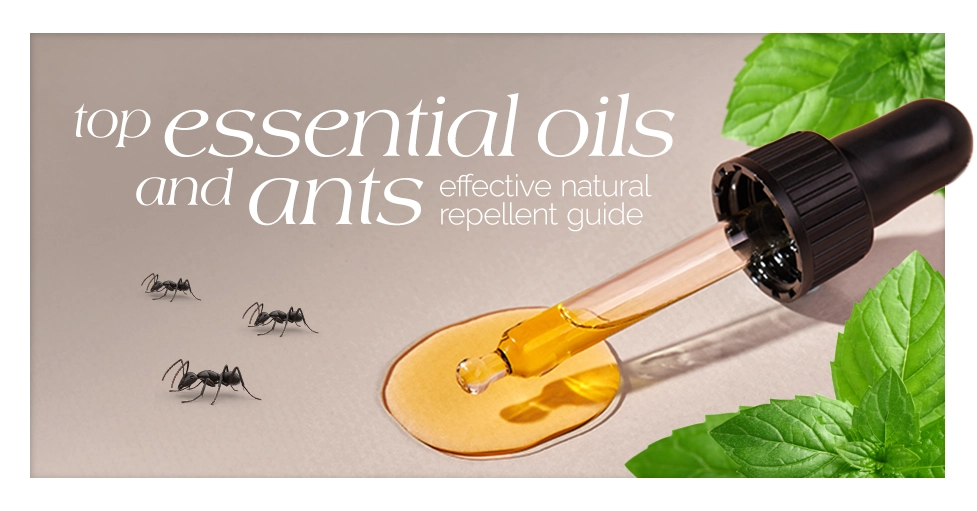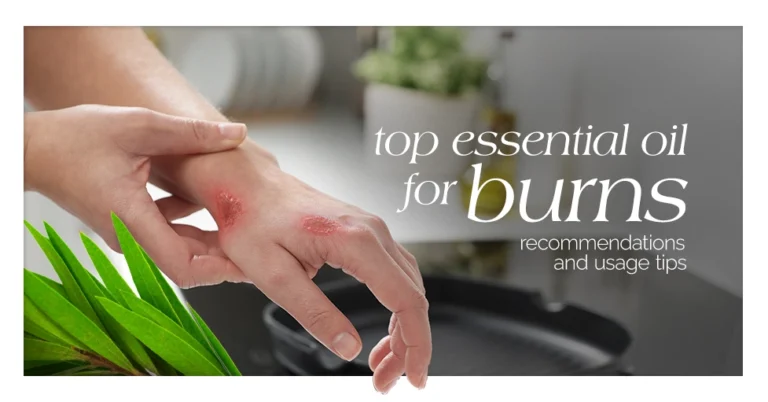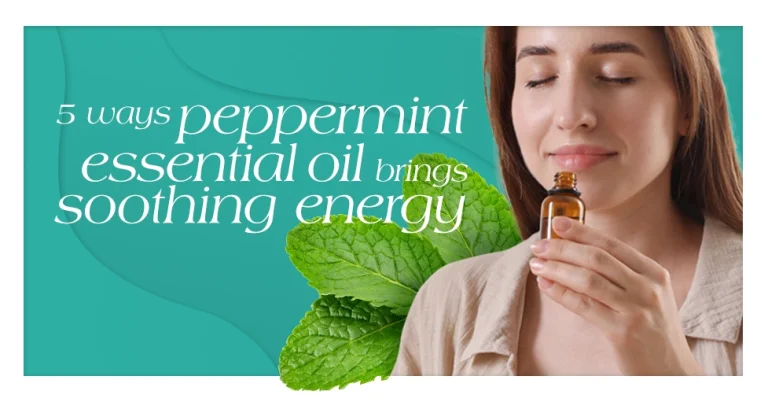Top Essential Oils and Ants: Effective Natural Repellent Guide
Looking for a natural way to keep ants out of your home? Essential oils and ants can be effectively managed without using harmful chemicals. In this article, we’ll show you how to use essential oils to protect your living space from ants.
Essential Insights and Ant-Busting Tips
- Essential oils such as peppermint, tea tree, and lemon are effective natural ant repellents that interfere with ants’ scent trails, confusing and repelling them.
- Specific essential oils, such as cinnamon, clove, and eucalyptus, not only repel ants but can also kill them, making these oils potent solutions for ant control.
- DIY essential oil solutions, including sprays and scent trail removers, can be created to target ants in specific areas, but proper usage and safety precautions must be followed to ensure effectiveness and avoid harm.
Introduction to Natural Ant Control
In the quest for a harmonious home, the wellbeing and safety of our family takes precedence, especially when dealing with invaders like ants. These common household pests aren’t just a nuisance; they’re on a mission for food and shelter, making our living spaces a target. But fear not, for we are not defenseless.
This guide shines a spotlight on essential oils, the eco-friendly warriors in the battle against ants. Harnessing their power, we can repel these tiny intruders without compromising the health of our loved ones or the planet. Prepare to transform your approach to pest control as we delve into the natural solutions at our disposal.
Understanding Ant Behavior
To stand a chance in the battle against ants, we must first understand our adversary. Ants are not just randomly wandering pests; they’re organized and efficient foragers, using complex communication to invade our homes. By deciphering their behavior, we unlock the key to repelling them effectively and naturally.
Knowing how to disrupt the ants’ well-oiled machine is crucial. Essential oils offer a strategic advantage, interfering with their scent trails and confusing their navigation. As we explore the ant world, we’ll see how these natural compounds can turn the tide in our favor.

Sign Up to Get Your FREE Essential Oils e-Book Here
Ant Species Commonly Found Indoors
Among the numerous ant species, two culprits commonly breach our defenses. Carpenter ants pose a structural threat, silently destroying wood as they build their nests. Then there are the fire ants, their painful stings a testament to their unwelcome presence. To target these invaders, we must tailor our strategies, employing natural defenses that speak directly to their weaknesses.
Repelling these insects is more than a matter of convenience; it’s a safeguard for our homes and our health. With the right natural ant repellent, we can deter these pests and protect our sanctuaries from their destructive habits.
How Ants Use Scent Trails

Ants are master trailblazers, leaving invisible maps laced with pheromones to guide their fellow foragers to food sources. This sophisticated form of communication is their lifeline, a highway of information that dictates their every move. Understanding this can be our greatest weapon in disrupting their activities.
By using natural repellents that interfere with these scent trails, we can throw ants into disarray, effectively repelling ants. It’s like wiping away their road signs, leaving them lost and less likely to return. This knowledge is the foundation on which we’ll build our defense, using nature’s own tools.
Scientific Evidence on the Efficacy of Essential Oils in Killing Insects
To provide a scientifically backed section for your article on the effectiveness of essential oils in killing insects, here are key findings from various studies:
Overview of Essential Oils and Their Insecticidal Properties
Essential oils, derived from various plants, have been shown to possess insecticidal properties. These oils work through different mechanisms, including neurotoxic effects and disruption of insect behavior.
Essential Oils and Ants Repellents

Essential oils are not just aromatic delights; they’re a formidable force against ants. Their strong scents act as natural deterrents, masking the very food sources ants seek and disrupting the critical scent trails they rely on for communication. Imagine creating an invisible barrier, a scented force field that confuses and repels these tiny invaders.
The secret lies in the oils’ potent properties, which can erase the trails ants leave behind and hinder their ability to regroup. With a strategic application, essential oils can keep your home ant-free, serving as a sustainable and natural solution to your ant problem.
Peppermint Essential Oil
Peppermint oil is a potent ally in the fight against ants. Its active compounds, menthol and thymol, not only mask ants’ pheromones but also serve as strong irritants to these tiny pests. When ants encounter the invigorating scent of peppermint, their trail becomes muddled, confounding their search for sustenance.
This essential oil’s refreshing aroma is anathema to ants, making it an excellent choice for both indoor and outdoor use. By incorporating peppermint oil into your ant-repelling arsenal, you’re employing a natural fumigant that’s both effective and pleasantly aromatic for humans.
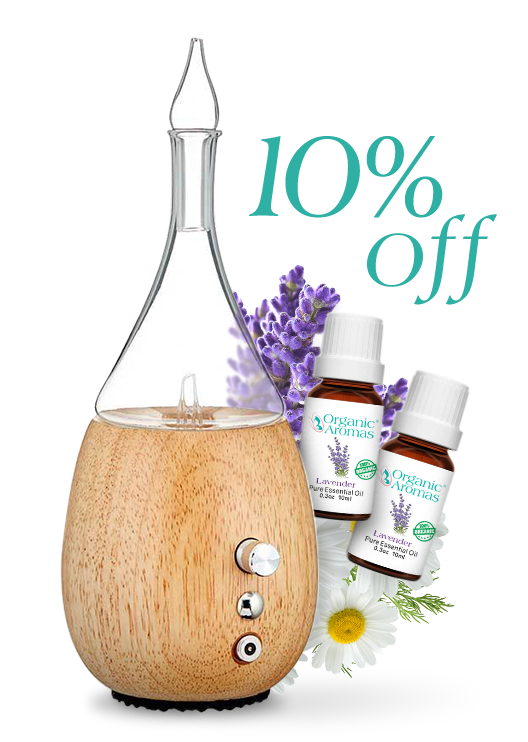
Join Now and Get a Coupon for 10% Off!
Tea Tree Essential Oil
Tea tree oil carries a strong and pungent aroma that’s highly effective in repelling not just ants, but a host of other pests. Its distinctive fragrance overwhelms ants, sending them scurrying away and disrupting their ability to follow their well-established trails.
This essential oil’s natural pesticide properties make it a valuable addition to your pest control toolkit. Spraying diluted tea tree oil around entry points can keep ants at bay, ensuring that these unwelcome guests think twice before crossing your threshold.
Lemon Essential Oil
Lemon essential oil, citronella essential oil, and lemongrass essential oil bring the power of citrus to the forefront of ant control. Their sharp scents effectively confuse ants by obscuring the pheromone trails they depend on. This disruption limits their ability to communicate and organize, which is an integral part of their foraging strategy.
The strong, fresh aroma of citrus oils like lemon is not only pleasant for us but also acts as a natural repellent for ants. Employing lemon oil in your anti-ant routine can provide a zesty barrier that protects your home from these persistent invaders.
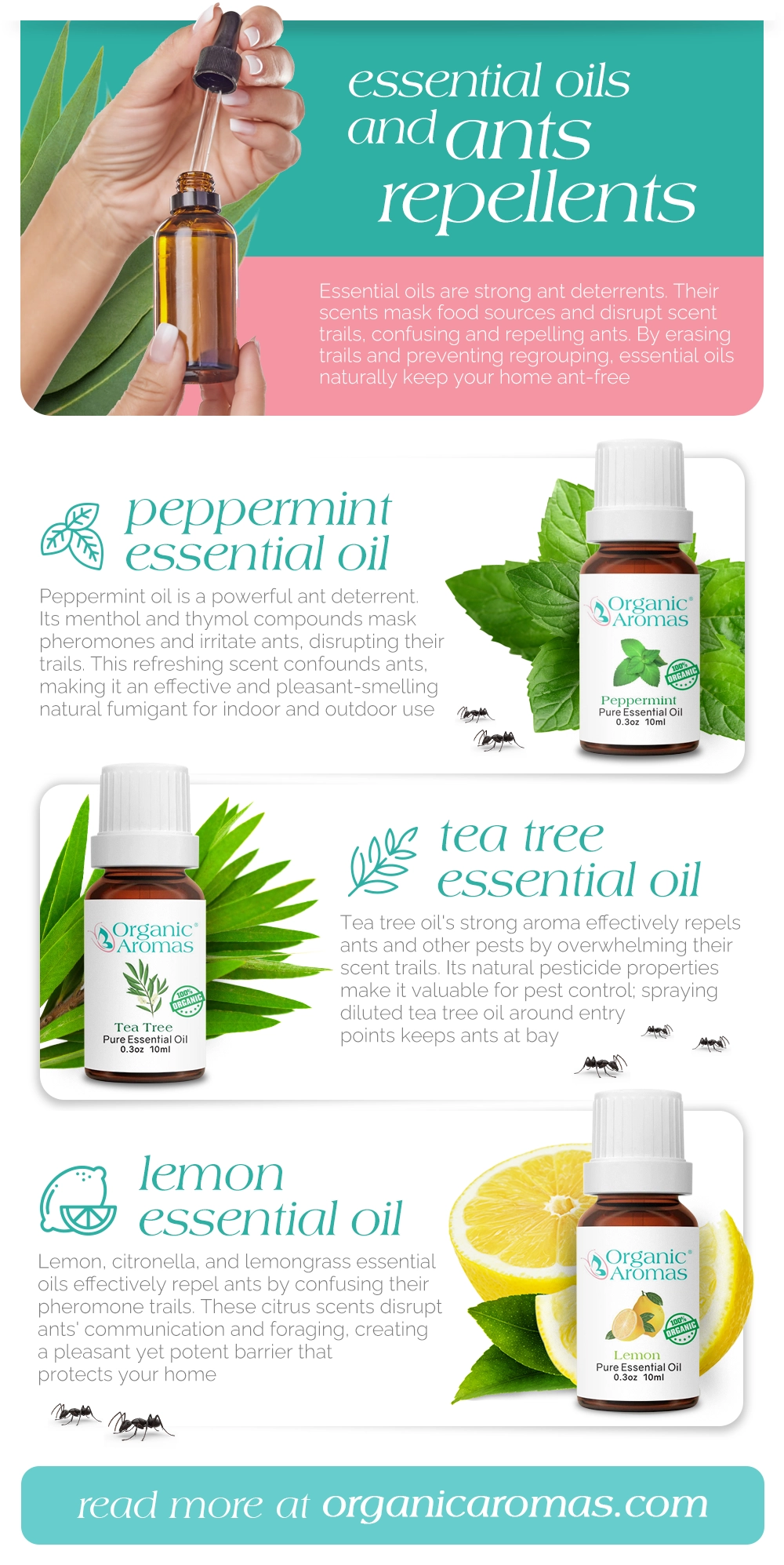
Best Essential Oils to Get Rid of Ants Naturally

When it comes to selecting the best essential oils for ant control, there are a few standout options. Cinnamon, clove, and eucalyptus oils are particularly effective, thanks to their unique properties that both repel and kill ants. These oils are not just about pleasant scents; they’re about harnessing nature’s power to maintain a pest-free home.
Each of these oils brings something special to the table:
- Cinnamon’s sweet aroma belies its lethal effect on ants
- Clove’s eugenol component acts swiftly to eradicate them
- Eucalyptus, with its refreshing scent, also masks ants’ trails, making it harder for them to navigate
Together, these oils form a natural and potent defense against ant invasions.
Cinnamon Essential Oil
Cinnamon essential oil is more than a festive fragrance; it’s a formidable foe for ants. The key component, trans-cinnamaldehyde, is known to kill ants on contact. Its sweet and spicy scent is attractive to humans but spells doom for ants, who find it unbearable to cross paths with.
Utilizing cinnamon oil in your fight against ants does more than repel them; it can also act as a lethal barrier. Sprinkling this oil around areas of ant activity can choke the pests, providing a dual-action solution to your ant problem.
Clove Essential Oil
Clove oil’s secret weapon lies in its eugenol content, a fast-acting natural insecticide that takes the fight directly to ants. This oil’s strong and spicy aroma is not only unpleasant for ants but also cuts through their communication lines, effectively breaking their trails.
By incorporating clove oil into your pest control routine, you’re utilizing a natural yet powerful agent that can quickly repel and eliminate ants. Its distinctive scent adds an aromatic edge to its insecticidal properties, making it a favored choice for those seeking a non-toxic solution.
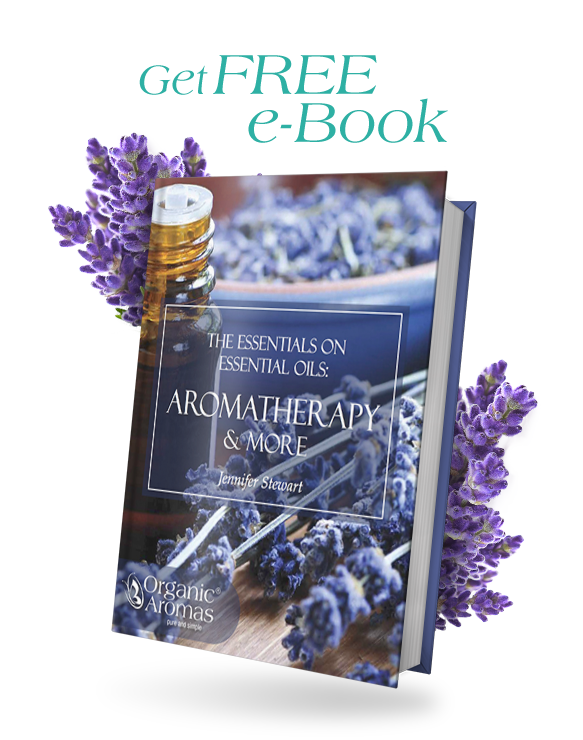
Sign Up to Get Your FREE
e-Book Here…
Eucalyptus Essential Oil
Eucalyptus oil is renowned for its strong, therapeutic aroma that also serves as an effective ant repellent. Its ability to mask the pheromones that ants rely on for navigation makes it an essential part of any natural pest control strategy, just like cedarwood essential oil.
Safe to use in homes with children and pets, eucalyptus oil offers a non-toxic way to keep ants at bay. Its refreshing scent is a bonus, adding a pleasant note to your home while keeping it protected from ant invasions.
DIY Essential Oil Solutions to Repel Ants

Creating your own ant repellent solutions with essential oils is not only effective but also gives you control over the ingredients you use in your home. These DIY concoctions offer a safe, natural alternative to chemical repellents, allowing you to target ants with precision and care.
With a few simple ingredients and some creativity, you can mix up powerful blends that will keep ants away. Whether it’s a spray, a scent trail remover, or an overnight killer, these solutions put the power of nature to work for you.
DIY Ant Repellent Spray
A DIY ant repellent spray is a convenient way to apply the power of essential oils where you need it most. By mixing the following ingredients, you can create a potent blend that can be easily sprayed in areas frequented by ants:
- Water
- Tea tree oil
- Peppermint oil
- Citrus oil
This spray acts as a natural deterrent, keeping ants from entering your home and disrupting their scent trails. Remember to shake the mixture well before each use to ensure the oils are evenly distributed for maximum effectiveness.
DIY Ant Scent Trail Remover
To combat ants’ sophisticated scent trails, a DIY ant scent trail remover can be highly effective. Combining water and white vinegar with tea tree and eucalyptus oils creates a powerful solution that can erase the pheromone paths ants leave behind.
Spraying this mixture directly onto trails and entry points not only disrupts ant communication but also helps prevent their return. For best results, reapply the solution regularly to keep these trails permanently obscured.
DIY Overnight Ant Killer Spray
For a more aggressive approach, a DIY overnight ant killer spray can be your secret weapon. A mixture of castile soap, water, and essential oils can be lethal to ants, effectively killing them while you sleep.
This solution is easy to create and can be sprayed around nests or paths where ants are active. By morning, you’ll find that the ants have been dealt with, allowing you to wake up to a pest-free home.
Incorporating a Nebulizing Diffuser: Enhancing Ant Control with Essential Oils
While DIY sprays and solutions are effective, incorporating a nebulizing diffuser can significantly enhance your ant control strategy with essential oils. Nebulizing diffusers work by breaking down essential oils into a fine mist, dispersing pure, undiluted oil particles into the air without using heat or water. This method of diffusion is particularly powerful for maintaining a continuous barrier against ants.
Benefits of Using a Nebulizing Diffuser
How to Use a Nebulizing Diffuser for Ant Control
Choose the Right Essential Oils: Oils like peppermint, tea tree, lemon, cinnamon, clove, and eucalyptus are excellent choices. These oils not only repel ants but can also kill them, providing a dual-action solution.
Set Up Your Diffuser: Place the nebulizing diffuser in areas where ants are most likely to enter, such as near doorways, windows, and kitchen areas. Make sure it is located in a central spot to maximize coverage.
Program the Diffuser: For optimal ant control, use the wifi smart socket and set the diffuser to run for 15 minutes every hour. This schedule ensures that the air remains saturated with essential oils, effectively keeping ants at bay.
Tips for Using Essential Oils Effectively
To get the most out of essential oils in your fight against ants, it’s important to use them effectively. Strategically targeting specific areas, combining essential oils with other methods, and adhering to safety precautions will ensure the best results.
While essential oils can create an invisible barrier that ants are reluctant to cross, they must be reapplied consistently due to their volatile nature. Let’s explore how to optimize their use for a lasting impact.
Targeting Specific Areas
Focusing on strategic areas such as entry points and common ant paths can significantly enhance the effectiveness of essential oils. Applying sprays or oil-soaked cotton balls to these spots ensures that you’re directly addressing the points of invasion.
Incorporating essential oils, such as lavender essential oil and patchouli essential oil, into your cleaning routine can also help maintain a repellent effect over time. Patch tests are recommended to ensure the oils do not damage surfaces or leave residues.
Combining Essential Oils with Other Methods
While essential oils are powerful on their own, combining them with other ant prevention strategies can lead to even greater success. Regular cleaning, sealing entry points, and good hygiene practices such as storing food in airtight containers all contribute to a comprehensive ant control plan.
Together with the consistent use of essential oils, these methods form a robust defense against ants, ensuring that your home remains a sanctuary free from these persistent invaders.
Safety Precautions
When leveraging the power of essential oils for ant control, safety should never be an afterthought. It’s imperative to keep these potent substances out of reach of children and pets to prevent accidental ingestion or skin contact. Proper dilution is also crucial to avoid any adverse reactions or sensitivities.
Moreover, while eucalyptus oil is non-toxic and relatively safe, some essential oils, particularly tea tree and peppermint, can be harmful to pets if ingested or applied to their skin. Additionally, avoid using these oils in areas where food is prepared to prevent contamination.

Join Our Exclusive Member Club to get Big Discounts!
Wrapping It All Up: Your Essential Oil Ant Control Guide
As we draw this guide to a close, it’s clear that essential oils offer a powerful, natural arsenal against ant invasions. By understanding ant behavior and employing the right oils, we can create an environment that is not only ant-free but also safe and pleasant for our families. From the refreshing scent of peppermint to the sharp citrus notes of lemon, these natural repellents can protect our homes without the use of harsh chemicals.
Embrace the wisdom of nature and let these fragrant protectors guard your home. With the guidance provided, you’re now equipped to craft your own DIY repellents, strategically apply them, and maintain a vigilant stance against these tiny trespassers. May your home remain a fortress, serene and secure, courtesy of the essential oils that stand watch.
Frequently Asked Questions
What essential oil will keep ants away?
Peppermint, spearmint, pennyroyal, garlic, and citronella essential oils are effective at keeping ants away. You can use these oils on cotton balls near entryways or spray them on surfaces where ants are present, or you can grow plants that ants dislike.
Can essential oils completely eliminate an ant infestation?
No, essential oils can’t completely eliminate an ant infestation, but they can be part of an effective control strategy when combined with other measures like cleanliness and sealing entry points.
How often should I reapply essential oil solutions?
It’s best to reapply essential oil solutions every few days or as soon as you notice a decrease in their effectiveness.
Are there any essential oils that are safe to use around pets?
Yes, eucalyptus oil is generally safe to use around pets, but it’s best to consult with a veterinarian if you have any concerns.
What is the best way to use essential oils for ant control?
The best way to use essential oils for ant control is to target specific areas where ants are active, such as entry points and trails, with essential oil sprays or soaked cotton balls. Combining this with regular cleaning and other ant-prevention methods enhances the effectiveness.
- Kavallieratos, N., Boukouvala, M., Ntalli, N., Skourti, A., Karagianni, E., Nika, E., Kontodimas, D., Cappellacci, L., Petrelli, R., Cianfaglione, K., Morshedloo, M., Tapondjou, L., Rakotosaona, R., Maggi, F., & Benelli, G. (2020). Effectiveness of eight essential oils against two key stored-product beetles, Prostephanus truncatus (Horn) and Trogoderma granarium Everts.. Food and chemical toxicology : an international journal published for the British Industrial Biological Research Association, 111255
- Moretti, M., Sanna-Passino, G., Demontis, S., & Bazzoni, E. (2008). Essential oil formulations useful as a new tool for insect pest control. AAPS PharmSciTech, 3, 64-74.
- Isman, M. (2000). PLANT ESSENTIAL OILS FOR PEST AND DISEASE MANAGEMENT. Crop Protection, 19, 603-608.

